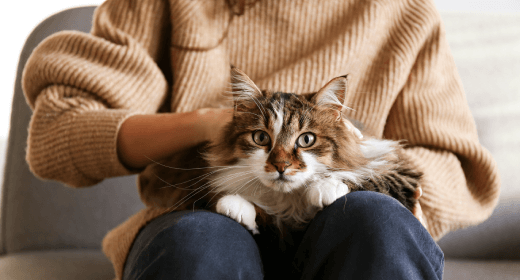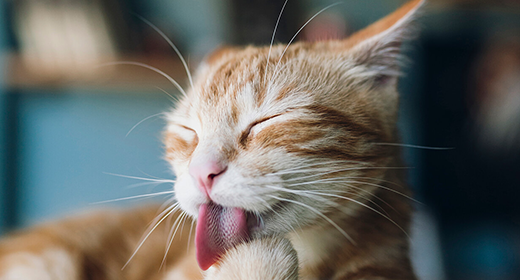

If you have ever indulged in a delicious piece of roasted chicken and noticed your furry friend giving you those irresistibly adorable, pleading eyes, you have probably wondered, 'Can cats eat chicken?'.
Chicken is a good source of protein, and you will find it as an ingredient in many commercial cat foods. However, there are some guidelines to follow. In this blog, we will uncover the delicious details about whether chicken is a friend or foe to our beloved furballs.
Is chicken good for cats? Well, when it comes to feline nutrition, chicken is often regarded as a favourite among our furry companions. Cats are obligate carnivores, which means that animal protein is essential for their overall health. Chicken, a lean and readily available source of protein, can offer several health benefits to your feline friend:
Chicken is a superb source of high-quality animal protein, which is essential for your cat's muscle development, growth, and overall body maintenance. Protein aids in tissue repair and supports a healthy coat.
Chicken is rich in essential amino acids, such as taurine, which is vital for cats. Additionally, taurine deficiency can lead to severe health issues, including heart problems and vision impairments.
Chicken contains essential vitamins and minerals like vitamin B6, niacin, phosphorus, and selenium. These nutrients contribute to your cat's overall well-being and help maintain a strong immune system.
Chicken has a naturally high moisture content, which can help keep your cat hydrated, especially if they are reluctant to drink water. Proper hydration is crucial for kidney health.
Most cats find chicken incredibly tasty, making it an excellent option for enticing picky eaters or cats with a diminished appetite.
While chicken can provide numerous health benefits to your cat, it should always be offered in moderation and as part of a balanced diet. Consult your veterinarian for guidance on the appropriate portion sizes and to ensure that chicken complements your cat's dietary needs.
If you have ever wondered whether it is safe to feed your cat raw chicken, be aware that it poses significant risks. Raw chicken, like other raw meats, can be contaminated with harmful. These pathogens can lead to severe gastrointestinal issues, including vomiting, diarrhoea, and even food poisoning in both cats and humans.
Additionally, when feeding your cat raw chicken increases the risk of nutrient imbalances and deficiencies, as it may lack essential nutrients that are destroyed during cooking.
To ensure your cat's safety, it is best to cook chicken thoroughly. Cooked chicken eliminates the risk of bacterial contamination and provides a safer and more digestible option for your feline friend.
Chicken bones, especially small and brittle ones like those in wings or drumsticks, can pose serious health risks to cats. Unlike dogs, cats have a more delicate digestive system and cannot process bones safely. When cats chew on or swallow bones, they can:
Small bones can get logged in a cat's throat, causing choking, gagging, or even airway obstruction.
Chicken bones can splinter into sharp pieces, which may damage a cat's mouth, throat, or digestive tract.
Bone fragments can create blockages in the gastrointestinal tract, leading to painful and life-threatening conditions.
Sharp bone fragments can puncture a cat's intestines or stomach, causing internal injuries and infections.
To keep your cat safe, always remove bones from chicken before offering it to them. Offer boneless, cooked chicken as an occasional treat, but ensure that it is free of seasonings, spices, and any potentially harmful ingredients.
Cats are known for their carnivorous cravings, but before you toss that raw chicken their way, hold your whiskers! While it might seem like a natural choice, there are some serious risks involved. Let's take a bite-sized look at what you need to know.
Raw chicken can be a breeding ground for nasty characters like Salmonella and Campylobacter. These troublemakers can cause a real bellyache for both your cat and you. Even if your feline friend does not show symptoms, they could pass these pathogens along to you, especially if you have got a delicate immune system. A real 'no-thank-you' dish!
Cooked or uncooked chicken bones can splinter into shards of trouble. These bone bits can wreak havoc on your cat's insides, causing choking, punctures, or blockages. To stay on the safe side, opt for boneless chicken or consider a vet-approved alternative.
Chicken is a protein powerhouse, but it is not the only game in town. Feeding your cat only raw chicken could lead to a dietary disaster. It is missing some crucial nutrients that your feline friend needs for a balanced diet. To keep their tails wagging, consult with a vet or feline nutrition guru to whip up a menu that is both tasty and nutritious.
When it comes to preparing raw chicken for your feline companion, a few key considerations can make all the difference in ensuring a safe and healthy meal:
Freshness is paramount. Check the sell-by date, and inspect the chicken for any signs of spoilage, such as an unusual odour or discoloration. Cats, like us, prefer their meals fresh and free from any hints of spoilage.
Handle raw chicken with care. Ensure your cutting board, knives, and utensils are clean and sanitized to prevent cross-contamination. Keeping a dedicated cutting board for cat food prep can help maintain hygiene.
Rinse the chicken thoroughly under cold water to remove any debris and pat it dry with a clean paper towel. This step helps minimise the risk of bacterial contamination, keeping your cat's meal safe and healthy.
While chicken can offer benefits to cats, it is important to remember a few key points. Always opt for cooked, boneless chicken in moderation, as raw chicken carries health risks due to bacterial contamination and nutrient imbalances. Furthermore, never offer chicken bones to cats, as they can be harmful.
Prioritising freshness and maintaining proper hygiene when preparing chicken for your cat is essential to ensure its safety and well-being. If you have any doubts or need guidance, consulting a veterinarian or a nutrition expert can help you provide a balanced and secure diet for your feline friend. Moreover, to avoid any safety and dietary concerns, why not go for IAMS cat food? With chicken as the first ingredient, our range of cat food is developed to meet your cat’s day-to-day nutrition quota.
Yes, it is generally safe to feed your cat cooked chicken as long as it is plain, unseasoned, and boneless. Avoid using any spices, herbs, or cooking oils that might be harmful to cats.
Kittens can eat chicken, but it should be cooked and cut into small, manageable pieces. Ensure it is boneless to prevent choking hazards, and it can be a part of a balanced kitten diet.
Boiled chicken for cats is a nutritious and easily digestible option, especially if they have digestive issues. However, it should still be boneless and served plain without any seasonings or additives.
Yes, cats can eat chicken hearts and liver in moderation. These organ meats are a good source of essential nutrients for cats. However, they should be cooked and fed as part of a balanced diet rather than as the sole food source to avoid nutritional imbalances.


Cats are known to be solitary creatures and enjoy spending time with themselves. However, as a pet parent, you must ensure that your cat remains healthy. It is advisable to keep an eye on your cat’s behavior to detect a sudden change, even what it eats, and in how much quantity. A regular health checkup is one of the most basic yet essential steps to a cat/kitty care guide. Taking care of cats is comparatively easier than taking care of kittens. A diligently followed routine for cat care can also be quite helpful.
Now that you have brought your cat home, the next step is to comfortably settle it in your house. Housetraining might sound like a tedious task but it isn’t. With a little practise and lots of patience, you can easily housetrain your cat. Some of the most basic things to keep in mind while housetraining your cat include providing a proper litter box, spaying your cat, toilet training and cat proofing the house. Given below are some tips that may help you easily housetrain your cat:
1) Place the cat’s litter box closer to the washroom.
2) Raise the height of the litter box a little every day.
3) Slowly, transition your cat to use the actual washroom every time it wants to go.
4) Give your cat a treat each time it uses the washroom. This will encourage good behavior.
Taking care of your cat’s health comes first in the cat/kitty care guide. Even though cats lick and self-groom themselves, they cannot get better on their own if they contract the following diseases:
If you notice unaccountable minor changes in your cat, then it is advisable to rush to the vet to rule out any of the above-mentioned diseases and seek proper treatment on time.
‘How to take care of a cat’ is a question asked by many first-time cat owners, as cats can be difficult to figure out. But with a few careful steps, you can easily take care of your cat. Here are some cat care tips for first-time cat owners: